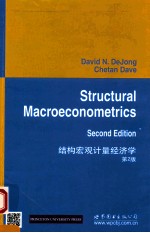图书介绍
结构宏观计量经济学 第2版 英文2025|PDF|Epub|mobi|kindle电子书版本百度云盘下载

- (美)德容(DeJong D.N.)著 著
- 出版社: 世界图书出版公司北京公司
- ISBN:7510058226
- 出版时间:2013
- 标注页数:418页
- 文件大小:55MB
- 文件页数:432页
- 主题词:
PDF下载
下载说明
结构宏观计量经济学 第2版 英文PDF格式电子书版下载
下载的文件为RAR压缩包。需要使用解压软件进行解压得到PDF格式图书。建议使用BT下载工具Free Download Manager进行下载,简称FDM(免费,没有广告,支持多平台)。本站资源全部打包为BT种子。所以需要使用专业的BT下载软件进行下载。如BitComet qBittorrent uTorrent等BT下载工具。迅雷目前由于本站不是热门资源。不推荐使用!后期资源热门了。安装了迅雷也可以迅雷进行下载!
(文件页数 要大于 标注页数,上中下等多册电子书除外)
注意:本站所有压缩包均有解压码: 点击下载压缩包解压工具
图书目录
Part Ⅰ Introduction3
1 Background and Overview3
1.1 Background3
1.2 Overview4
2 Casting Models in Canonical Form9
2.1 Notation9
2.1.1 Log-Linear Model Representations11
2.1.2 Nonlinear Model Representations11
2.2 Linearization12
2.2.1 Taylor Series Approximation12
2.2.2 Log-Linear Approximations14
2.2.3 Example Equations15
3 DSGE Models:Three Examples18
3.1 Model Ⅰ:A Real Business Cycle Model20
3.1.1 Environment20
3.1.2 The Nonlinear System23
3.1.3 Log-Linearization26
3.2 Model Ⅱ:Monopolistic Competition and Monetary Policy28
3.2.1 Environment28
3.2.2 The Nonlinear System33
3.2.3 Log-Linearization34
3.3 Model Ⅲ:Asset Pricing38
3.3.1 Single-Asset Environment38
3.3.2 Multi-Asset Environment39
3.3.3 Alternative Preference Specifications40
Part Ⅱ Model Solution Techniques51
4 Linear Solution Techniques51
4.1 Homogeneous Systems52
4.2 Example Models54
4.2.1 The Optimal Consumption Model54
4.2.2 Asset Pricing with Linear Utility55
4.2.3 Ramsey's Optimal Growth Model56
4.3 Blanchard and Kahn's Method57
4.4 Sims'Method61
4.5 Klein's Method64
4.6 An Undetermined Coefficients Approach66
5 Nonlinear Solution Techniques69
5.1 Projection Methods71
5.1.1 Overview71
5.1.2 Finite Element Methods72
5.1.3 Orthogonal Polynomials73
5.1.4 Implementation74
5.1.5 Extension to the l-dimensional Case78
5.1.6 Application to the Optimal Growth Model79
5.2 Iteration Techniques:Value-Function and Policy-Function Iterations87
5.2.1 Dynamic Programming87
5.2.2 Value-Function Iterations89
5.2.3 Policy-Function Iterations94
5.3 Perturbation Techniques95
5.3.1 Notation95
5.3.2 Overview97
5.3.3 Application to DSGE Models99
5.3.4 Application to an Asset-Pricing Model105
Part Ⅲ Data Preparation and Representation113
6 Removing Trends and Isolating Cycles113
6.1 Removing Trends115
6.2 Isolating Cycles120
6.2.1 Mathematical Background120
6.2.2 Cramér Representations124
6.2.3 Spectra125
6.2.4 Using Filters to Isolate Cycles126
6.2.5 The Hodrick-Prescott Filter128
6.2.6 Seasonal Adjustment130
6.2.7 Band Pass Filters131
6.3 Spuriousness134
7 Summarizing Time Series Behavior When All Variables Are Observable138
7.1 Two Useful Reduced-Form Models139
7.1.1 The ARMA Model139
7.1.2 Allowing for Heteroskedastic Innovations145
7.1.3 The VAR Model147
7.2 Summary Statistics149
7.2.1 Determining Lag Lengths157
7.2.2 Characterizing the Precision of Measurements159
7.3 Obtaining Theoretical Predictions of Summary Statistics162
8 State-Space Representations166
8.1 Introduction166
8.1.1 ARMA Models167
8.2 DSGE Models as State-Space Representations169
8.3 Overview of Likelihood Evaluation and Filtering171
8.4 The Kalman Filter173
8.4.1 Background173
8.4.2 The Sequential Algorithm175
8.4.3 Smoothing178
8.4.4 Serially Correlated Measurement Errors181
8.5 Examples of Reduced-Form State-Space Representations182
8.5.1 Time-Varying Parameters182
8.5.2 Stochastic Volatility185
8.5.3 Regime Switching186
8.5.4 Dynamic Factor Models187
Part Ⅳ Monte Carlo Methods193
9 Monte Carlo Integration:The Basics193
9.1 Motivation and Overview193
9.2 Direct Monte Carlo Integration196
9.2.1 Model Simulation198
9.2.2 Posterior Inference via Direct Monte Carlo Integration201
9.3 Importance Sampling202
9.3.1 Achieving Efficiency:A First Pass206
9.4 Efficient Importance Sampling211
9.5 Markov Chain Monte Carlo Integration215
9.5.1 The Gibbs Sampler216
9.5.2 Metropolis-Hastings Algorithms218
10 Likelihood Evaluation and Filtering in State-Space Representations Using Sequential Monte Carlo Methods221
10.1 Background221
10.2 Unadapted Filters224
10.3 Conditionally Optimal Filters228
10.4 Unconditional Optimality:The EIS Filter233
10.4.1 Degenerate Transitions235
10.4.2 Initializing the Importance Sampler236
10.4.3 Example239
10.5 Application to DSGE Models241
10.5.1 Initializing the Importance Sampler243
10.5.2 Initializing the Filtering Density245
10.5.3 Application to the RBC Model246
Part Ⅴ Empirical Methods253
11 Calibration253
11.1 Historical Origins and Philosophy253
11.2 Implementation258
11.3 The Welfare Cost of Business Cycles261
11.4 Productivity Shocks and Business Cycle Fluctuations268
11.5 The Equity Premium Puzzle273
11.6 Critiques and Extensions276
11.6.1 Critiques276
11.6.2 Extensions279
12 Matching Moments285
12.1 Overview285
12.2 Implementation286
12.2.1 The Generalized Method of Moments286
12.2.2 The Simulated Method of Moments294
12.2.3 Indirect Inference297
12.3 Implementation in DSGE Models300
12.3.1 Analyzing Euler Equations300
12.3.2 Analytical Calculations Based on Linearized Models301
12.3.3 Simulations Involving Linearized Models306
12.3.4 Simulations Involving Nonlinear Approximations307
12.4 Empirical Application:Matching RBC Moments308
13 Maximum Likelihood314
13.1 Overview314
13.2 Introduction and Historical Background316
13.3 A Primer on Optimization Algorithms318
13.3.1 Simplex Methods319
13.3.2 Derivative-Based Methods328
13.4 Ill-Behaved Likelihood Surfaces:Problems and Solutions330
13.4.1 Problems330
13.4.2 Solutions331
13.5 Model Diagnostics and Parameter Stability334
13.6 Empirical Application:Identifying Sources of Business Cycle Fluctuations337
14 Bayesian Methods351
14.1 Overview of Objectives351
14.2 Preliminaries352
14.3 Using Structural Models as Sources of Prior Information for Reduced-Form Analysis355
14.4 Implementing Structural Models Directly360
14.5 Model Comparison361
14.6 Using an RBC Model as a Source of Prior Information for Forecasting364
14.7 Estimating and Comparing Asset-Pricing Models373
14.7.1 Estimates380
14.7.2 Model Comparison384
References387
Index401
热门推荐
- 1714831.html
- 2262316.html
- 1375305.html
- 25157.html
- 2881010.html
- 1002644.html
- 755198.html
- 2260556.html
- 3738014.html
- 2075831.html
- http://www.ickdjs.cc/book_1038200.html
- http://www.ickdjs.cc/book_2130149.html
- http://www.ickdjs.cc/book_3365566.html
- http://www.ickdjs.cc/book_2519350.html
- http://www.ickdjs.cc/book_3855327.html
- http://www.ickdjs.cc/book_390095.html
- http://www.ickdjs.cc/book_1100122.html
- http://www.ickdjs.cc/book_3113281.html
- http://www.ickdjs.cc/book_3150004.html
- http://www.ickdjs.cc/book_3380225.html